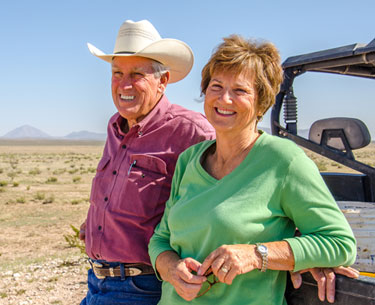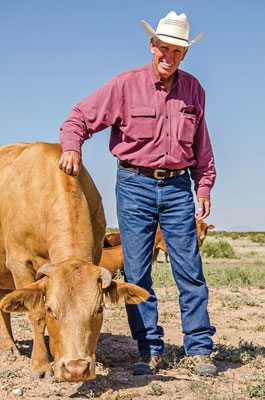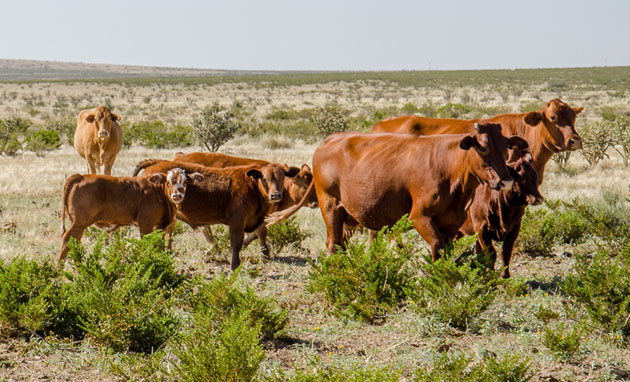Several years ago, West Texas cattle rancher Bunny Beard was browsing a farmers market in Carmel, Calif., when one busy vendor swamped with customers caught her eye.
“The guy was selling grass-fed beef, and people were all over his booth,” she recalls. “I couldn’t believe the prices he was getting — $16 to $20 a pound! I remember thinking, ‘Now there’s a market we need to get into!’”

Rob and Bunny Beard
Photos by Sheryl Smith-Rodgers
Back at home on the Double U Ranch near El Paso, Bunny told her husband, Rob, what she’d seen, but he resisted her nudging to investigate further. At first, that is.
“He’s a cowboy, and he was used to ranching one way,” she says, smiling. “But I told him that he’d fit, because that’s what he does — his cattle are raised naturally on grass.”
After Rob saw for himself the premium-priced beef in grocery stores and meat markets, he conceded that Bunny’s idea had potential. Lots of it. Today, the Double U’s certified all-natural beef gets top dollar under the brand name of Premium Natural Beef, a company based in Lone Wolf, Okla.
Harsh Country
On the arid plains of the Chihuahuan Desert, water is scarce, and rainfall is rare, which means hay can’t be grown. The Beards rely on the ranch’s native grasses and other plants to feed their 800 Beefmaster–Red Angus crossbreds, which are given salt and mineral protein as their only supplement.
A Dedicated Co-op Leader
Rob Beard has been a board member of Dell Telephone Cooperative for 12 years and currently serves as vice president. “In remote areas like ours, it’s critical to provide modern communication technology via broadband and fiber optic cable, so our ranchers, farmers and businesses can keep up to date and compete in today’s markets,” Rob says. “Dell Telephone provides this service throughout West Texas and southern New Mexico. Dell Telephone is owned and managed by the people it serves — people who know and understand the needs of the area and the people who live here,” he says.
“Our cattle have to make a living on the grass,” Rob says. “If they don’t bring a calf to the house, then they have to go. Out here, our stocking rate averages 90 to 100 acres a cow. But we’ve had below-average rainfall for 24 months now, so I’m running about 150 to 175 acres per animal. The Double U, including leased land, is 140,000 acres because it takes a whole lot of country here to ranch successfully.”
It takes experienced help to run such a sprawling operation. Foreman Truitt Helm and his wife, Lauri, work full time on the ranch. During busy times, some of the Beards’ relatives fly in from other states, stay several weeks, and help to gather and brand cattle.
Top-Notch Record Keeping
Although he didn’t change how he runs his herd, Rob does follow record-keeping protocol required by USDA-approved, third-party verification programs administered by IMI Global Inc. in Castle Rock, Colo. The extra effort adds substantial value to his cow-calf operation.
“Through IMI, we are age- and source-verified,” he says. “We know when our calves are born, and document it. We’re also certified as Non-Hormone Treated Cattle. I don’t use hormones or antibiotics, and I haven’t treated a sick animal in at least five years. But if I do have a sick calf, I ear-tag and record it, then it doesn’t go to a sale. IMI also certifies our beef as ‘all natural.’”
On the Double U, calves are branded and processed at three months of age. “After they’re weaned, we run them through the chute and give them a full range of vaccines,” Rob says. “Then they’re put back into the pasture to acclimate to being weaned and processed. After 45 days, they’re shipped to a feeding operation that grows them under an all-natural protocol.”
Both the feedlot and the Double U Ranch meet welfare guidelines established by the Global Animal Partnership, which advocates for the humane treatment of animals in agriculture. “Rob is a very gentle stockman,” Bunny says. “He works his cattle without a lot of stress.”
“We also hire haulers who treat the cattle well and haul them with little stress,” Rob adds.

From California to Texas
Love for the land and cattle runs deep in Rob, whose family has owned the same California ranch since 1858. His great-grandmother was 12 years old when her family traveled westward across the Great Plains in a covered wagon. His great-grandfather, Walker Rankin Sr., introduced some of the first Hereford cattle into Kern County, Calif.
In 1970, Rob’s parents, Bob and Alice Beard, who’d been running the family’s California ranch, partnered with Joe Mendiburu to purchase the Double U Ranch, located 50 miles east of El Paso in Hudspeth County. For nearly 25 years, the couple lived on and ran the Texas operation until Bob’s health began to decline.
Enter Rob and Bunny, who bought the Double U in 1995. “Rob was in the feedlot business, but he’d always wanted to have his own cow-calf operation,” Bunny says. “Not me. I didn’t want to move to Texas. I’m a California girl! The day we moved out here, the mover left our furniture and boxes on the front porch. An 80-mile-per-hour wind blew in, and I watched an antique trunk go flying by. I thought, ‘What have I gotten myself into?’
“But I grew to love the Southwest,” she smiles. “The beautiful light and the pure blue skies here — you don’t get those in California.”

Originally, Bob Beard and his partner financed the Double U through the Texas Production Credit Association, which later merged with Capital Farm Credit. Since 1994, Matt Mastic, senior vice president/branch manager of Capital’s El Paso office, has worked with the Beards as their loan officer.
“My family has been with the bank for 45 years,” Rob says. “Capital Farm doesn’t change their officers around, so then they get to know their customers. I like that.”
Dealing With Nature
Creosote bushes, cholla cacti and yuccas flourish in the ranch’s hard, dry soils. In good years, native gramas and other grasses grow robust and tall enough to hide a calf. But this year, another summer without monsoons left the Beards’ grasslands sparse. To fit the natural rainfall cycle, Rob moved his calving time from January to April, which also enables the cows to be dry in the hardest part of the year. “Another advantage is that the following spring is actually a better time to market our calves,” he says.
Wells are the Beards’ main source of water. When the couple took over the Double U, the property had two 1,500-foot wells, but a poor distribution system. “Now water’s pumped to high points on the ranch, then gravity-fed to tanks across the ranch,” Rob says. “We’ve installed miles and miles of pipelines. Maintaining them is the bulk of our work on the ranch. Because the cows are native to this country, they take pretty good care of themselves.”
Ample water has benefited wildlife, as well. “We have prime habitat for pronghorn antelope,” Rob says. “We’ve renovated and built miles of fencing with bottom wires that measure 16 to 18 inches above the ground so the pronghorn can slip underneath them. They don’t jump like white-tailed deer.”
The Future
Once in a while, Bunny nudges her husband about retiring someday, but Rob resists.
“What else would I do?” he asks. “I don’t play golf or fish. Here on the Double U, I feel like I’m on vacation every day of my life. I’m doing what I love to do, and that’s ranch. I am blessed!”